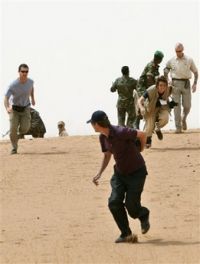Extreme caution needed in entering Darfur from Chad
Aug 24, 2006 (BRUSSELS) — In the last five weeks, the Sudan government has arrested three journalists who crossed into Darfur from Chad without Sudanese visas. Slovenian photojournalist Tomo Kriznar was apprehended in Fasher, capital of North Darfur state, on 19 July. He was convicted of espionage on 14 August and sentenced to two years’ imprisonment. The two other journalists, both Americans, were seized near the Chad border by the Minni Minawi faction of the Sudan Liberation Army and handed to Khartoum’s Military Intelligence.
 One of the two Americans has since been expelled from Sudan, by order of a court in Fasher, after being convicted of entering the country illegally. There are reports that a condition of his release was silence about the arrest of the second American – two-time Pulitzer prizewinner Paul Salopek of the Chicago Tribune.
One of the two Americans has since been expelled from Sudan, by order of a court in Fasher, after being convicted of entering the country illegally. There are reports that a condition of his release was silence about the arrest of the second American – two-time Pulitzer prizewinner Paul Salopek of the Chicago Tribune.
On 5 May, Minawi became the only rebel leader to sign the Darfur Peace Agreement with the Sudan government. He reaped his reward on 7 August when he was appointed Senior Assistant to President Omar al Bashir, the fourth highest-ranking executive position in the country. In recent weeks, government forces, Janjaweed and Minawi’s ex-rebels have been fighting together against those rebels who did not sign the peace agreement. It is now clear that Minawi and the government are cooperating in the seizure of foreigners attempting to gather information on abuses occurring in Darfur.
Well-informed sources in Darfur and Khartoum say the pro-government forces are planning an offensive against the non-signatories of the peace agreement. This may be one reason for the clampdown on journalists who were previously welcomed to Darfur, and transported around the region, by Minawi’s Zaghawa-dominated SLA faction. But there is also speculation that the government is seeking bargaining chips – hostages – to ward off the deployment of a UN force in Darfur.
Justice Minister Mohamed Ali al Mardi announced the arrest of Salopek at a press conference on 21 August, almost two weeks after Minawi’s forces seized him from his escort near Um Berro, south of Furawiya, in North Darfur. The minister went on to warn against the deployment in Darfur of an international force against the government’s will.
Entering Darfur without a visa through Zaghawa territory north of Geneina, capital of West Darfur state, is fraught with risk and should not be undertaken lightly, even by those who know Darfur well. Although Minawi has lost a lot of ground in North Darfur of late, his forces are mobile and heavily armed. Almost from the outset, the SLA has been marked by division at the top and constantly shifting allegiances lower down. The reliability of any escorts in Darfur cannot be guaranteed, even though the Fur-dominated faction of the SLA and the SLA-Unity group that controls most of North Darfur are not cooperating with the government and are eager for journalists to visit areas under their control.
Entering Darfur through Masalit territory south of Geneina will also be problematic, and risky, in future. The SLA’s Masalit forces are now almost entirely in Chad and dependent upon Chadian security and largesse. The Chad government is improving its relations with Sudan after months of tension and sporadic conflict and on 23 August announcing it was expelling seven leaders of another Darfur rebel group, the Justice and Equality Movement. Although much smaller than the SLA, JEM has also been escorting journalists into and around Darfur.
(News safty Institute)
